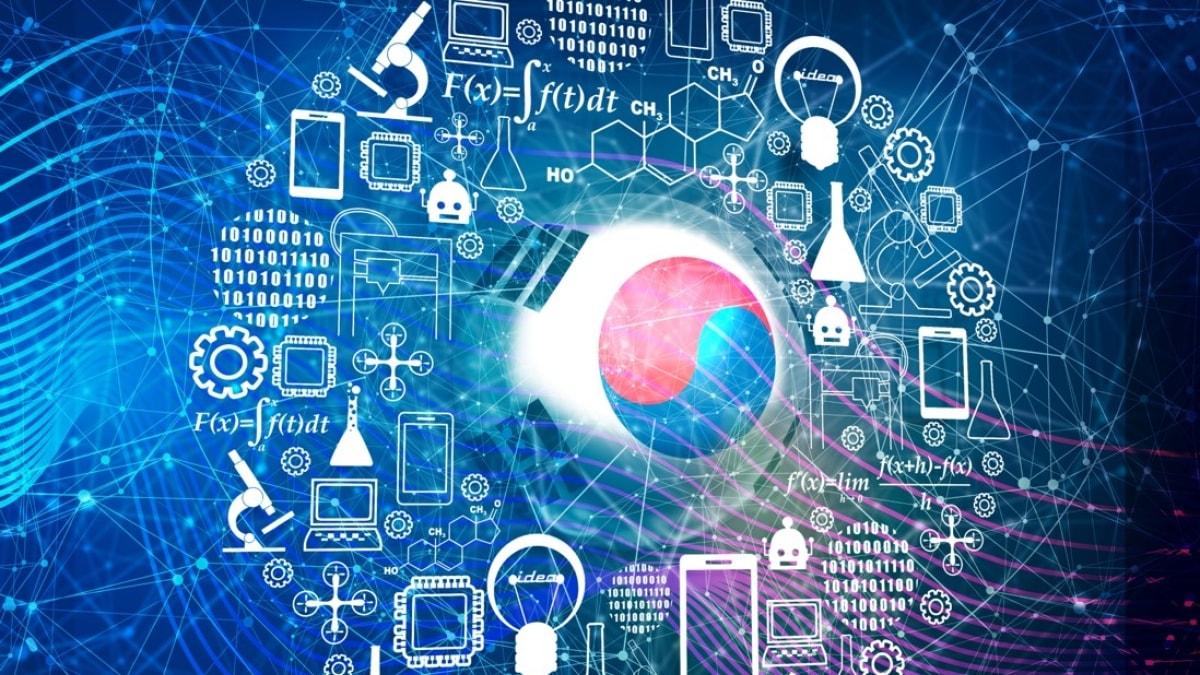What is Korea doing to accelerate digital transformation?
(Baonghean.vn) - Over the past few years, the Korean Government has undertaken a new digital transformation to address existing problems in public sector operations by harnessing the power of advanced technology.
Busan is a typical example of this digital transformation. According to the Global Smart City Index (SCI) rankings published in 2022, Busan is ranked 22nd out of 75 smartest cities in the world. These are considered smart cities with digital as the center. In addition, Busan is also ranked 15th in the world in high-tech fields such as blockchain, artificial intelligence (AI) and financial technology (Fintech), which are core technologies of the 4th industrial revolution (CMCN 4.0) and the digital economy.
 |
Illustration photo. |
Over the past two decades, South Korea has built and operated a world-class, widely recognized, successful e-government. The South Korean government has consistently ranked first to third in the United Nations e-Government Development Index since 2010 and has led the world in information technology infrastructure, open public data, and government innovation efforts.
However, behind the success of the past 20 years are fundamental limitations that can hardly guarantee success in the next 20 years. In the rapid informatization process since the 2000s, a large number of information technology (IT) systems have been developed. Meanwhile, most ministries and organizations of the Korean Government have their own affiliated units to build and upgrade their respective systems based on their expertise.
As a result, the fragmentation between ministries and agencies is increasing, making it more difficult to link systems and data. With such a large volume of government systems, it is more difficult to meet citizens' expectations of receiving highly personalized, integrated services.
Some say that the Korean government’s path to digitalization initiatives began in the late 1970s, but it has made significant progress in recent years. In order to further accelerate the digital transformation and become a global model and standard, the Korean government has developed and formulated an innovation strategy, the Digital Platform Government Strategy.
In this article, we will look at how the implementation of Korea's Digital Government strategy is progressing and what measures need to be taken to maintain optimal cybersecurity.
What is digital government?
Digital Platform Government is a term used to describe the Korean Government's strategy of using digital technologies to provide efficient and convenient public services to the people.
 |
Illustration photo. |
The Korean government has launched the Digital Platform Government initiative with the aim of building a more responsive and efficient government by using information and communications technology (ICT) to transform public services.
The envisioned digital government will fundamentally transform government operations into a people-centric government, a scientific and transparent government, and a government that promotes private sector growth by fully leveraging the opportunities presented by rapidly evolving digital technologies such as AI and cloud computing.
South Korea aims to create a one-stop government, breaking down barriers between ministries and agencies, seeking to realize a digital platform government to provide priority, integrated and personalized services according to citizens' needs through cooperation and data sharing between ministries and agencies.
Another important goal is to build a scientific government based on data-driven policymaking. The digital government will act as a platform for public-private cooperation. To achieve this goal, Korea will make most government data public and provide maximum support to private companies in providing government services in combination with their own services through Open APIs. Korea’s digital government will also serve as a platform for the public and private sectors to collaborate and experiment with various innovative approaches.
Digital Government is a transformation of the government's operating model, in which people and businesses are at the center and the government supports them. It will be a government that reaches out to people and businesses, not a government that people and businesses have to come to. In Digital Government, ministries and sectors will cooperate with each other, the government and the private sector will coordinate to solve problems. Digital Government will act as a testing ground for startups to plan and launch new services. Innovative ideas from the private sector will come true and capable startups will come together to create an ecosystem on Digital Government.
The Digital Government Initiative aims to increase citizen participation in government decision-making, improve government transparency and accountability, and promote innovation and economic growth.
The main tasks of the Digital Government Platform Strategy
The Korean government will focus on the following tasks to best implement the Digital Government Platform - where all data is connected.
First, the government plans to build a digital government innovation infrastructure to promote public-private collaboration and provide fully integrated one-stop government services. From this perspective, Korea will enhance advanced connectivity between existing systems, and then design and establish an innovation infrastructure in line with the digital government philosophy. In the final stage, Korea plans to create an environment to provide appropriate services that meet the people's growing expectations by actively introducing advanced technologies from the private sector, such as cloud computing, big data, and hyperscale AI.
Second, the government plans to fully open up and promote the use of high-value data that the public wants. To achieve this goal, the government will abolish regulations or systems that hinder the openness and use of data, and facilitate high-quality data through data standardization, MyData (empowering individuals by improving their autonomy over their data), and policies that promote identity information.
Third, the government will innovate by making the most of AI and data technology. Public-private, inter-ministerial and central-local government collaboration will become common, moving away from fragmented workflows that focus on individual ministries and agencies. Furthermore, data-driven policymaking will be emphasized to give more priority to best practices and practical experience. The government also plans to boost digital competency training so that civil servants can easily adapt to data- and AI-driven workflows.
Last but not least, the government plans to build a trustworthy information security environment so that all citizens can trust the Digital Government. By establishing a system that can transparently check the history of personal information access or use, Korea hopes to alleviate public concerns about the leakage or misuse of personal information. Furthermore, Korea will build a more secure and trustworthy Digital Government by adopting cutting-edge security technologies such as blockchain, AI, and quantum cryptography.
What has South Korea done to promote its digital government strategy?
South Korea has made significant progress in developing a digital government platform, aiming to provide efficient and convenient online services to its citizens. The country's digital transformation is a top priority for the government, with significant investments in developing digital infrastructure and technology.
One of the major initiatives undertaken by the Korean government is the “Smart Work” project, which aims to promote flexible work arrangements and increase productivity through the use of digital technology. As part of this initiative, the government has introduced a range of online tools and platforms to support remote working, including collaboration and video conferencing tools.
Smart work is a connected working environment, in which people can work anywhere, anytime on the basis of information technology. People can work at home or while traveling by using smart phones or tablets. In particular, with this new system, people can go to smart work centers (abbreviated as SWC) near where they live instead of having to go all the way to the company office, which will help save travel time. Even if you have small children, you can pick them up at the nursery and then go back to work.
Thus, there are 4 basic types of Smart work: "Work at home" using IT devices, "Mobile work" using smartphones, "Flexible work" allowing you to adjust your working time as you wish and "Work at Smart work centers" are work stations set up near your home. In short, people can work regardless of space and time based on information technology platforms. Therefore, Smart work is also considered a "revolution in work".
The government has also introduced a number of online services for citizens, including e-government services, digital identity and online tax filing. These services have been designed to be user-friendly and accessible to all, with a focus on improving the convenience and efficiency of government services.
South Korea is also a leader in developing digital infrastructure, with one of the highest broadband penetration rates in the world. The government has invested heavily in developing 5G mobile networks and high-speed internet, which has facilitated the development of a thriving digital economy and a range of innovative digital services.
South Korea’s digital government is seen as a model for other countries looking to transform their public services and improve citizen engagement through digital technology. However, there are also concerns around issues such as privacy and data security that the government will need to address as it continues to develop its digital platform.
The Importance of Cybersecurity to Korea's Digital Government Strategy
Cybersecurity is of particular importance to Korea's Digital Government strategy for several reasons:
1. Protect sensitive data:The South Korean government collects and stores a significant amount of sensitive data about its citizens, including personal information, financial data, and healthcare records. Cybersecurity measures are necessary to protect this data from cyberattacks and data breaches.
2. National security:The South Korean government operates a number of critical infrastructure systems, including the power grid, transportation systems, and communications networks. Cybersecurity threats to these systems have the potential to disrupt essential services and threaten national security.
3. Economic growth:South Korea's digital economy is one of the most advanced in the world, and its success is closely linked to the security of its digital platforms and infrastructure. Cyberattacks on businesses and financial institutions can disrupt economic growth and cause significant financial losses.
4. Trust and confidence:Cybersecurity breaches can erode public confidence in the government’s ability to protect citizen data and secure critical infrastructure systems. Maintaining a strong cybersecurity posture is essential to maintaining public trust and confidence in digital government.
In the process of digital transformation, a number of cybersecurity measures have been put in place. However, the threat of cyber attacks is still present and it is important to implement more preventive procedures to enhance the security of digital identification (ID) systems and other digital protocols.
Without strong security solutions, digital platforms will struggle to be deployed on a wider scale and adoption will slow down.
How can South Korea improve cybersecurity?
There are a number of ways that large companies and organizations in South Korea can improve the security of their new digital government. Countries like Estonia and India have implemented their own digital ID systems and have successfully addressed issues by implementing technology. Here are some ways that cybersecurity can be improved.
Using IP address lookup tool
The best way to protect against cyber attacks is to track who is using your digital systems. One very effective way to do this is to use an IP (Internet Protocol) address lookup tool. IP address lookups can play a vital role in improving cybersecurity by providing valuable information about the origin of potential cyber threats. They allow cybersecurity professionals to quickly identify the location and owner of an IP address, which can help them assess potential risks and take appropriate action to protect their systems and data.
In the event of a cybersecurity incident, IP lookup tools can provide valuable information about the origin of the attack. This information can be used to identify the attacker and take steps to prevent future attacks. They are relatively easy to implement and can be used by companies in all industries. Companies can run their own IP scans using a tool or hire a professional to conduct a full IP address audit.
Strengthening the legal framework
Korea should continue to strengthen its legal framework related to cybersecurity, including laws and regulations related to data protection, cybercrime, and cybersecurity incident response. This can help prevent cybercrime and improve accountability for cybersecurity incidents.
Implementing new frameworks may take time as new regulations will need to be adopted and approved by a number of officials. However, improving legal frameworks related to cybersecurity will be important in the long term as the Digital Government strategy is implemented on a wider scale.
Raising awareness of cybersecurity
Cybersecurity awareness and education programs can help raise awareness about the importance of cybersecurity and best practices for protecting digital systems and data. These programs should target a wide range of stakeholders, including government officials, businesses, and individual users.
Companies should provide training to their staff and ensure that cybersecurity is at the forefront of their day-to-day operations. This will reduce the risk of cybersecurity issues being forgotten and left unattended for long periods of time. The world of cybercrime is constantly evolving, so it is important that companies continually work to improve their cybersecurity efforts./.








